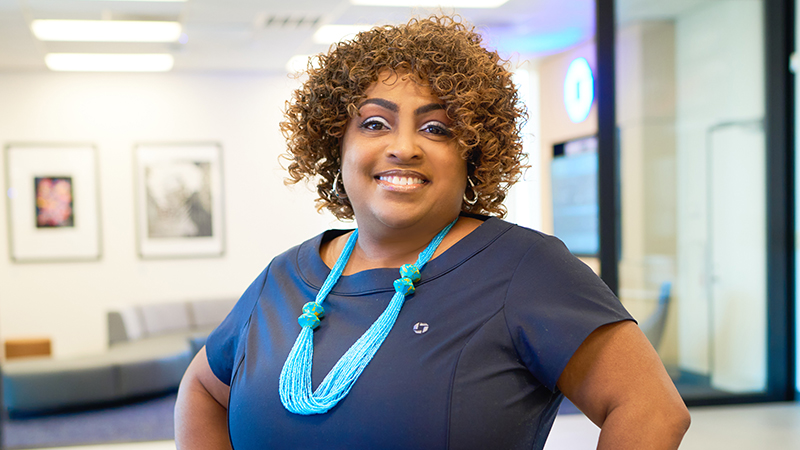Businesses and community partners in Southern Dallas are coming together to improve job outcomes for Black, Hispanic, and Latino workers.
A version of this story originally appeared in The Atlantic.
In Texas’s Dallas and Collin Counties, Black, Hispanic, and Latino households are twice as likely to be economically insecure as white households. That means they don’t earn enough to provide for a basic family budget, including essentials such as groceries, transportation, and health care.
These racial disparities stand in the way of equitable economic opportunity. For that reason, JPMorgan Chase has partnered with the United Way of Metropolitan Dallas (UWMD), an organization that seeks to address the underlying systemic barriers that often inhibit Black, Hispanic, and Latino workers from reaching equitable employment opportunities. It does this by investing in supportive services, such as child care in Southern Dallas, which enables more parents—particularly Black, Latina, and Hispanic mothers—to enter the workforce.
In 2015, UWMD launched the Pathways to Work collaboration. This program aims to eliminate pay inequities and desegregate high-growth industries in Dallas by building cross-industry partnerships with employers, financial backers, and skills-training educators to determine workforce needs and arrive at collective solutions. JPMorgan Chase was instrumental in launching Pathways to Work. The bank was interested in learning how to improve job outcomes across the country, and in UWMD, it found a much-needed workforce intermediary partner to help address the barriers that workers in Dallas face.
Since the launch of Pathways to Work, JPMorgan Chase has provided UWMD with more than $930,000 in funding to expand opportunity for all Dallas workers and support more equitable representation in the local labor market. Pathways to Work—which is overseen by Andrea Glispie, UWMD’s senior director of career pathways—is the only workforce collaborative of its kind in Texas.
One important facet of UWMD’s Pathways to Work program is that it works directly with employers to develop targeted skills programs that train workers for jobs in high-demand sectors, creating an inclusive pipeline to employment in industries that have a low representation of Black workers, such as construction, and of Hispanic and Latino workers, such as health care. UWMD also supports employers in implementing more inclusive hiring practices, such as setting diversity goals, assessing talent, and advocating for skills-based rather than credentials-based hiring.
For instance, in assessing the local labor market, UWMD found that only 12 percent of Black workers and 8 percent of Hispanic and Latino workers were in traditionally high-paying computer and technology jobs. So, in 2021, in collaboration with the Dallas Regional Chamber, and with JPMorgan Chase’s financial support, it created a new program called the Dallas Technology Pipeline Partnership. It brings together stakeholders from the tech industry and IT training providers to develop skills programming for workers and facilitates the hiring of the program’s graduates by also involving recruiters and hiring managers.
This kind of collaboration is key to UWMD’s work.
Pathways to Work Results & Impact From 2015–2020:
1,667 Enrolled in Skills Training
1,117 Earned Industry-Recognized Credentials
929 Placed in Jobs
The result of breaking down these walls is opportunity: More workers in Southern Dallas can pursue jobs in high-paying industries that once seemed inaccessible.
A crucial element underlying this effort is local access to financial institutions. As more workers from Southern Dallas are hired for higher-paying jobs, the presence of low-cost financial services in their community means that, for instance, rather than having to use a costly check-cashing service, residents can instead visit their local bank and build wealth.
To address this, a Chase Community Center branch opened in the Oak Cliff neighborhood of Southern Dallas in March 2021. It’s a local banking option that directly empowers residents with its free financial education programming and services. Terri Thomas, the Oak Cliff branch’s community manager, leads monthly workshops, one of which is known locally as “Terri Talks,” on subjects such as managing credit and budgeting, both at the branch and in community spaces such as churches. The branch also provides complimentary home-buying workshops and informational sessions with Chase business consultants on various topics, including navigating your cash flow.
Thomas notes that access to financial institutions and knowledge doesn’t benefit Southern Dallas alone.
“Oak Cliff is everybody’s community. There’s an Oak Cliff all across the United States, just like there’s a Chicago all across the United States, just like there’s a Detroit all across the United States,” Thomas says. “So the customers and clients and the community that I work with, they look like my aunties. They talk like my cousins. They walk like my uncle. It’s a universal need that is not necessarily specific to Oak Cliff but to a lot of cities in America.”
If Dallas and Collin Counties reach racial equity in pay, the average annual income for Black workers would double, and the average income for Hispanic and Latino workers would be two-and-a-half times higher.
What’s more, the whole region would benefit: Its GDP would rise 35 percent—a total of $115 billion added to the community.
“We want to make sure that we positively impact the community that we serve, so that’s prioritizing its growth and health,” says Thomas. “Because, ultimately, when the community does well, we all do well.”
Learn more about how JPMorgan Chase is driving inclusive growth in DFW through intentional investments.




